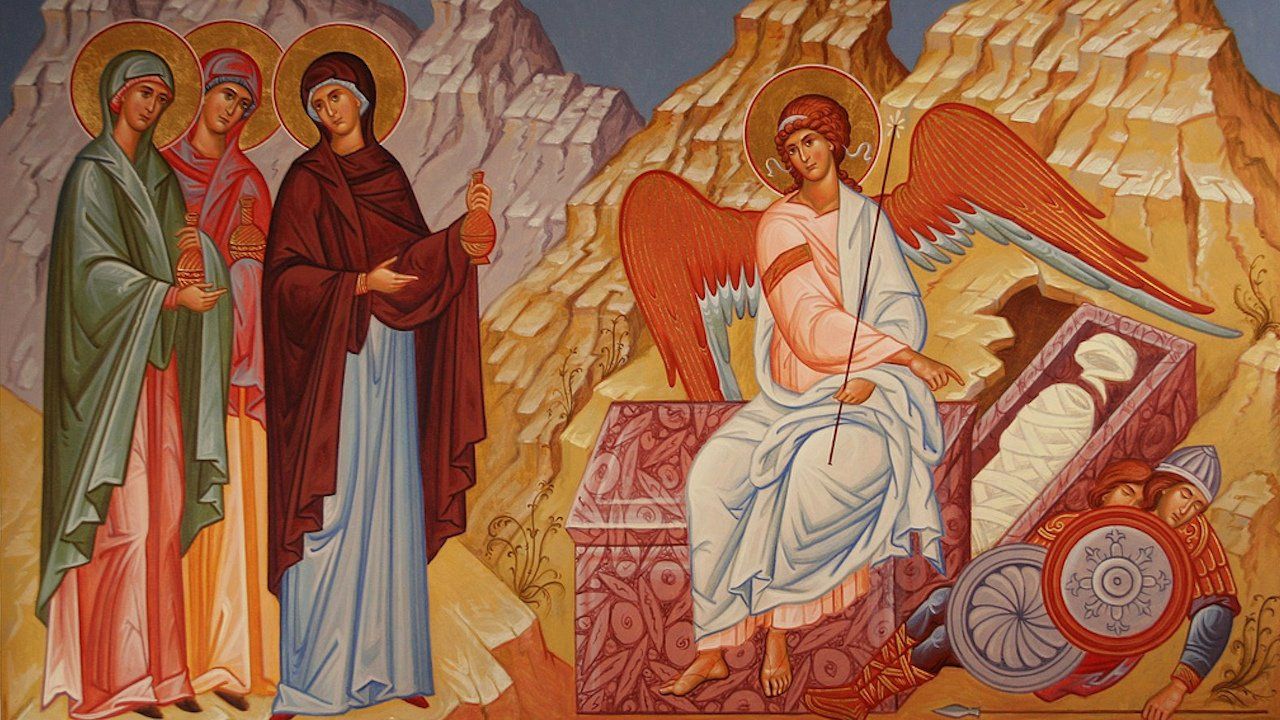TODAY WE
shall give you a sermon on the Lord’s resurrection. In relation to this, if Christ’s birth from the Virgin is something divine, how much more so is His resurrection from the dead! Therefore, let not that which is divine be heard with merely human interpretation.
“Late in the night of the Sabbath,” Scripture says, “as it began to dawn towards the first day of the week.” The evening of the Sabbath – the day of this world does not know this; the usage of the world does not contain it. The evening terminates the day, it does not begin it. The evening fades into darkness; it does not grow bright. It does not change into dawn, because it does not know the sunrise.
Evening, the mother of night, gives birth to daylight! It changes the customary order while it acknowledges its Creator. It displays a new symbolic mystery. It is eager to serve its Creator rather than the march of time.
“Late in the night of the Sabbath,” it says, “as it began to dawn towards the first day of the week, Mary Magdalen and the other Mary came to see the sepulcher.” Earlier, a woman hastened to sin; now, later on, a woman hastens to repentance. In the morning a woman knew that she had corrupted Adam; in the evening a woman seeks Christ.
“Mary Magdalen and the other Mary came to see the sepulcher.” A woman had drawn a beginning of perfidy out of Paradise. Now, a woman hastens to draw faith from the sepulcher. She who had snatched death out of life now hurries to get life out of death. [A woman took death from the tree of life; now, a woman takes life from the tomb, the abode of death.]
“Mary came.” This is the name of Christ’s Mother. Therefore, the one who hastened was a mother in name. She came as a mother, that woman, who had become the mother of those who die, might become the mother of the living, and fulfillment might be had of the Scriptural statement [about her]: “that is, the mother of all the living” (Gen. 3:20).
“Mary came, and also the other Mary.” Scripture does not say they came, but she came. Two women of one name came through a symbolic mystery, not through chance. “Mary came, and also the other Mary.” She came, but another, too. Another came, but the first, too, so that woman might be changed in life, but not in name; in virtue, but not in sex. A woman had been the intermediary of the fall and ruin, and a woman was to be the one to announce the Resurrection.
“Mary came to see the sepulcher.” The sight of the tree had deceived her; the sight of the sepulcher was to restore her. A guileful glance had laid her low; a saving glance was to raise her up again.’
“And behold,” the Gospel continues, “there was a great earthquake; for an angel of the Lord came down from heaven.” The earth trembled, not because an angel came down from heaven, but because its Ruler ascended from hell. “And behold, there was a great earthquake.” The heart of the earth is stirred. The depths of the earth leap up. The earth trembles, the huge mountains quiver, the foundations of the earth are battered. Hell is caught, and set in its place. Death gets judged – death which, rushing against guilty men, runs into its Judge; death which after long domination over its slaves rose up against its Master; death which waxed fierce against men but encountered God.
Rightly, therefore, did the rule of hell perish, and its laws get blotted out. The power of death was taken away, and, in penalty for its rashness in attempting to harm its Judge, death brought the dead back to life. Thereupon bodies were yielded up. The man was put back together, and his life was restored, and now everything holds together through forgiveness, because the condemnation has passed over onto the Author of life.










